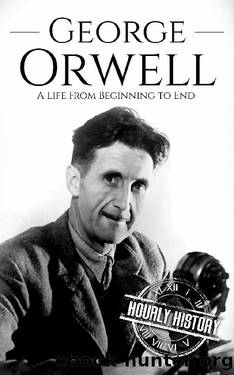George Orwell: A Life from Beginning to End (Biographies of British Authors Book 3) by Hourly History

Author:Hourly History [History, Hourly]
Language: eng
Format: epub
Published: 2019-11-04T18:30:00+00:00
Chapter Six
Animal Farm
âWe pigs are brainworkers. The whole management and organisation of this farm depend on us. Day and night we are watching over your welfare. It is for YOUR sake that we drink that milk and eat those apples.â
âGeorge Orwell, Animal Farm
Orwellâs Animal Farm was written as a bitter critique of the Russian Revolution and the emergence of communism under Joseph Stalin. As has been stated previously, Orwell made a clear distinction between Stalinâs communism (Stalinism), which he loathed, and socialism, which he admired. Orwell was eager to show the events that led up to the November revolution and the resulting corruption of Stalinâs communist state. Despite Stalinâs claim of equality, it had become a brutal reign of terror.
Orwell wrote Animal Farm during the later years of World War II, at a time when the Allies were very much dependent on the Soviet Union to fight the Axis Powers of Germany and Japan, so several American and English publishers, seeing the book as an outright attack on the Soviet regime, rejected the manuscript for that reason.
The story of Animal Farm begins with a parallel to Russia prior to the revolutionâwith the animals of the farm wanting freedom from their oppressive rulers, the farmers. Rejecting the power of the humans, the animals hold secret meetings to organize an uprising against their owner. They eventually overthrow Farmer Jones and run the farm themselves. In the beginning, their efforts are successful, and food is plentiful; every animal is equal and shares the labor and the fruits of the labor equally. Soon, however, as the pigs on the farm gain a leadership position, they begin to hoard most of the available food for themselves, leaving less and less for the other animals.
The pigs eventually become the new class elite, much like the Sovietâs post-revolutionary apparatchik. Slowly, they dominate all the other animals. Two of the most prominent pigs, Snowball and Napoleon, argue over who will be the ultimate leader (reflecting the power struggle between Stalin and Trotsky). In the novel, Napoleon engages in fake trials and purges to elicit confessions and eliminate his enemies. The pig named Squealer, like the Russian propaganda machine, continuously offers excuses and justifies this use of tyranny.
Animal Farm is told from the point of view of hardworking and common farm animals. They are not educated enough to oppose the oppression, and they demonstrate their loyalty to the pigs through obedience. Orwell shows how this naivety prevents the animals from questioning the oppressors among them. They are defenseless against the ruling pigs. In Animal Farm, language is used as a means of control and to manipulate. Words are distorted and left without meaning. Squealer summarized communism as, âAll animals are equal, but some animals are more equal than others.â Certainly, the word equal has been twisted beyond recognition.
When Snowball suggests building a windmill, Napoleon objects and has Snowball chased from the farmâmuch the same way Trotsky was banished from Russia. Napoleon, now the winner and absolute ruler of the farm, immediately changes how the farm is to be run.
Download
This site does not store any files on its server. We only index and link to content provided by other sites. Please contact the content providers to delete copyright contents if any and email us, we'll remove relevant links or contents immediately.
Einstein: His Life and Universe by Walter Isaacson(1332)
Finding Freedom: Harry and Meghan and the Making of a Modern Royal Family by Omid Scobie & Carolyn Durand(1186)
Promised Land (9781524763183) by Obama Barack(1161)
Compromised by Peter Strzok(1076)
Finding Freedom by Omid Scobie(1067)
JFK by Fredrik Logevall(1008)
Freedom by Sebastian Junger(647)
Salford Lads: The Rise and Fall of Paul Massey by Bernard O'Mahoney(593)
The Russia House by John Le Carré(572)
Kremlin Winter by Robert Service(537)
Day of the Dead by Mark Roberts(524)
Graveyard (Ed & Lorraine Warren Book 1) by Ed Warren & Lorraine Warren & Robert David Chase(514)
A World Ablaze by Craig Harline(513)
Flying Tiger by Samson Jack(510)
Joe Biden: American Dreamer by Evan Osnos(500)
100 Things Successful Leaders Do by Nigel Cumberland(482)
Melania and Me: The Rise and Fall of My Friendship With the First Lady by Stephanie Winston Wolkoff(482)
The Irish Buddhist by Alicia Turner(481)
The Mission by David W. Brown(467)
